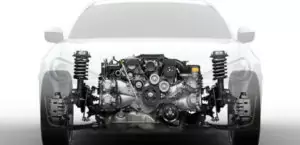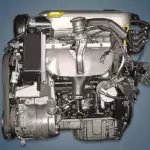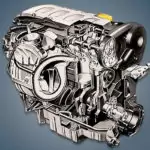The 2.2-liter Opel Y22DTR or L50 diesel engine was produced from 2000 to 2005 and was installed on a number of popular models of the company, such as Astra, Vectra, Signum or Zafira. This unit was the most voluminous and powerful diesel engine of the concern of its own design.
The Y family also includes engines: Y17DT, Y20DTH and Y22DTH.
The engine was installed on:
- Opel Astra G (T98) in 2002 – 2005;
- Opel Signum A (Z03) in 2003 – 2004;
- Opel Vectra B (J96) in 2000 – 2002; Vectra C (Z02) in 2002 – 2004;
- Opel Zafira A (T98) in 2001 – 2005.
Specifications
| Production years | 2000-2005 |
| Displacement, cc | 2171 |
| Fuel system | direct injection |
| Power output, hp | 120 – 125 |
| Torque output, Nm | 270 – 280 |
| Cylinder block | cast iron R4 |
| Block head | aluminum 16v |
| Cylinder bore, mm | 84 |
| Piston stroke, mm | 98 |
| Compression ratio | 18.5 |
| Features | intercooler |
| Hydraulic lifters | yes |
| Timing drive | chain |
| Phase regulator | no |
| Turbocharging | VGT |
| Recommended engine oil | 5W-40 |
| Engine oil capacity, liter | 5.5 |
| Fuel type | diesel |
| Euro standards | EURO 3 |
| Fuel consumption, L/100 km (for Opel Vectra 2003) — city — highway — combined |
8.2 4.7 6.0 |
| Engine lifespan, km | ~350 000 |
| Weight, kg | 195 |
Disadvantages of the Y22DTR engine
- The life of an Opel owner with such an engine is spent in the fight against airing the system.
- The high-pressure fuel pump electrician has low reliability, the control transistor often burns.
- Timing chains here last a long time, but their guide rails are not at all as strong.
- Due to problems with the lubrication of the liners, the crankshaft often breaks at high mileage.
- As with any diesel engine, the diesel particulate filter and the EGR valve get dirty very quickly.






